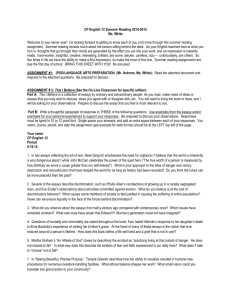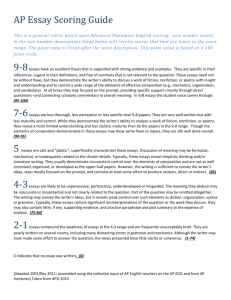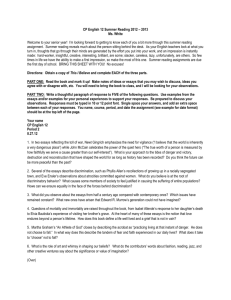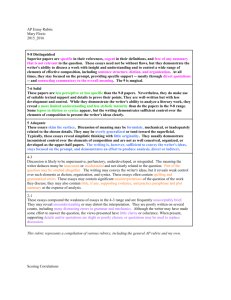Graduate Craft Seminar: Narrative Strategies in Fiction
advertisement
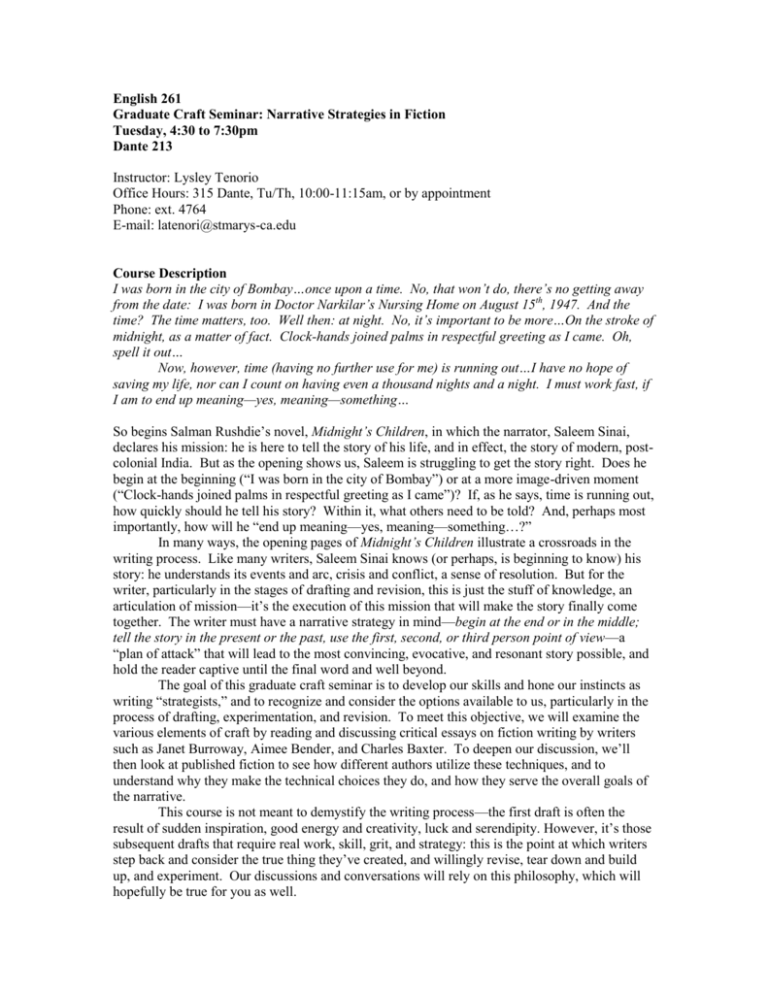
English 261 Graduate Craft Seminar: Narrative Strategies in Fiction Tuesday, 4:30 to 7:30pm Dante 213 Instructor: Lysley Tenorio Office Hours: 315 Dante, Tu/Th, 10:00-11:15am, or by appointment Phone: ext. 4764 E-mail: latenori@stmarys-ca.edu Course Description I was born in the city of Bombay…once upon a time. No, that won’t do, there’s no getting away from the date: I was born in Doctor Narkilar’s Nursing Home on August 15th, 1947. And the time? The time matters, too. Well then: at night. No, it’s important to be more…On the stroke of midnight, as a matter of fact. Clock-hands joined palms in respectful greeting as I came. Oh, spell it out… Now, however, time (having no further use for me) is running out…I have no hope of saving my life, nor can I count on having even a thousand nights and a night. I must work fast, if I am to end up meaning—yes, meaning—something… So begins Salman Rushdie’s novel, Midnight’s Children, in which the narrator, Saleem Sinai, declares his mission: he is here to tell the story of his life, and in effect, the story of modern, postcolonial India. But as the opening shows us, Saleem is struggling to get the story right. Does he begin at the beginning (“I was born in the city of Bombay”) or at a more image-driven moment (“Clock-hands joined palms in respectful greeting as I came”)? If, as he says, time is running out, how quickly should he tell his story? Within it, what others need to be told? And, perhaps most importantly, how will he “end up meaning—yes, meaning—something…?” In many ways, the opening pages of Midnight’s Children illustrate a crossroads in the writing process. Like many writers, Saleem Sinai knows (or perhaps, is beginning to know) his story: he understands its events and arc, crisis and conflict, a sense of resolution. But for the writer, particularly in the stages of drafting and revision, this is just the stuff of knowledge, an articulation of mission—it’s the execution of this mission that will make the story finally come together. The writer must have a narrative strategy in mind—begin at the end or in the middle; tell the story in the present or the past, use the first, second, or third person point of view—a “plan of attack” that will lead to the most convincing, evocative, and resonant story possible, and hold the reader captive until the final word and well beyond. The goal of this graduate craft seminar is to develop our skills and hone our instincts as writing “strategists,” and to recognize and consider the options available to us, particularly in the process of drafting, experimentation, and revision. To meet this objective, we will examine the various elements of craft by reading and discussing critical essays on fiction writing by writers such as Janet Burroway, Aimee Bender, and Charles Baxter. To deepen our discussion, we’ll then look at published fiction to see how different authors utilize these techniques, and to understand why they make the technical choices they do, and how they serve the overall goals of the narrative. This course is not meant to demystify the writing process—the first draft is often the result of sudden inspiration, good energy and creativity, luck and serendipity. However, it’s those subsequent drafts that require real work, skill, grit, and strategy: this is the point at which writers step back and consider the true thing they’ve created, and willingly revise, tear down and build up, and experiment. Our discussions and conversations will rely on this philosophy, which will hopefully be true for you as well. Course Texts Course reader/ handouts (provided by instructor) Stories for group presentations Two short books (to be announced later in the term) Course Requirements 1. Completion of all writing exercises Week by week, we’ll discuss different aspects of craft, and the various ways they can be used in fiction. You will then be assigned a short writing exercise in conjunction with our discussion and the assigned reading, to be submitted the following week (typed, double-spaced, single-sided). 2. One short story developed from one class exercise Near the end of the term (exact date to be determined later) you will submit a full story based on and expanded from one writing exercise. OR… One complete revision of an older short story or novel chapter As some of you will be working on your thesis, I want you to devote as much time to that as necessary. In lieu of this, you will have the option of revising an older piece in conjunction with some of the exercises we’ve done in class. If, for example, you decide to do use part of an older story for a POV exercise, you may revise that piece using a new POV, and making all other necessary revisions. 3. Group Presentation Working as a group, you will find a published short story from a current literary journal and lead a craft discussion on the piece. The author should be a new writer, one who hasn’t necessarily garnered the same kind of attention as the writers we’re reading in our course reader—this is a chance to discover a new writer, and share your discovery with the class. The story should be one that evokes a strong reaction from the group. For example, you may find an experimental piece that seems to defy every “rule” of craft we’ve discussed, yet succeeds as a story brilliantly. Or, you may find one that follows the conventions of craft with clear expertise, yet fails miserably. We’ll discuss the requirements for the presentation later in the semester. Each presentation should be approximately 45 minutes, and should include an in-class writing exercise of your own creation. 4. Individual conference Each student is required to meet with me at least once during the semester, to discuss your story submission. Count on meeting some time in late March/ early April. 5. Weekly readings Each week we will read short stories or novels, along with craft-related essays. Please be sure you’ve read these prior to our class discussion, and that you arrive with questions, opinions, and observations about these readings. 6. Participation This is a graduate level seminar. In order to pass the course, you must contribute to our discussions every class session, by offering comments and questions and responding to them as well. You will be expected to participate in and engage the discussion every class session, throughout the entire term. Attendance Unless it’s an absolute emergency, please do not be absent. Talk to me if you need to miss class, and please let me know the reason. If you must be absent, this is the attendance policy: 1 absence is a freebie. A second absence should be an absolute emergency (illness, family situation, flood, etc.). A third absence means (in most cases) that you will not pass the class. Excessive tardiness (more than two) will count as one absence. Arriving to class more than thirty minutes late will be considered an absence. If you must arrive late to class due to emergencies (illness, family situation, that flood, etc.), let me know in advance by calling my office extension. If ours is your first class of the day, allot plenty of time for traffic. The Caldecott Tunnel and St. Mary’s Road can be terrible around 4pm, so plan accordingly. READING SCHEDULE (subject to change) 2/14 Introduction Review syllabus Essays “Some Basic Definitions” Alice Laplante “Two General Truths About Craft” George Garrett Stories “The Man in Bogota,” Amy Hempel “The Raft,” Peter Orner “The Rapture,” Skip Horack 2/21 Conflict—Internal and External Essays “Conflict, Crisis, and Resolution” Janet Burroway “Conflict, the Key to Access,” Stephen Koch Stories “Orientation,” Daniel Orozco “The Hull Case,” Peter Ho Davies 2/28 Characterization Showing and Telling The Scene Essays “Character Motivation,” Aimee Bender “Making a Scene: Fiction’s Fundamental Unit,” Anna Keesey Stories “You’re Ugly, Too,” Lorrie Moore “Awaiting Orders,” Tobias Wolff 3/6 Plot and Structure Surprise and Suspense Beginnings and Endings Essays “Incremental Perturbation: How to Know Whether You’ve Got a Plot or Not” John Barth “The Lingerie Theory of Literature,” Julie Chekoway Stories “Marie,” Edward P. Jones “Sea Oak,” George Saunders 3/13 Point of View: First Person Essays “Casting Shadows, Hearing Voices: The Basics of Point of View” Valerie Miner “A Container of Multitudes, or When ‘I’ Isn’t ‘Me’: The Art of First Person” Alyce Miller Stories “Why Antichrist?” Chris Adrian “The Idiot President,” Daniel Alarcon 3/20 Point of View: Third Person Essays “And Eyes to See: The Art of Third Person” Lynna Williams “At What Distance?” Janet Burroway “Reconsidering Omniscience in Contemporary Writing” Jenny Dunning Stories “The Caprices,” Sabina Murray “Love and Hydrogen,” Jim Shepard 3/27 “Big” Stories, “Little” Stories Time Management in Fiction Essays Excerpts from “The Literary Clock: Strategies for Handling Time in Fiction” Amy Weintraub “Long Time in Short Stories, Or Why Can’t a Story Be More Like a Novel?” Joan Silber Stories “The Behavior of the Hawkweeds,” Andrea Barrett “Cathedral,” Raymond Carver 4/3 SPRING BREAK 4/10 Voice and Tone Theme Essays “I Gotta Use Words When I Talk to You: Theme,” Janet Burroway “You’re Really Something: Inflection, Tone, and Pitch,” Charles Baxter Stories “Everything Ravaged, Everything Burned,” Wells Tower “Brokeback Mountain,” Annie Proulx 4/17 Author Visit (TBA) 4/24 Author Visit (TBA) 5/1 PRESENTATIONS 5/8 PRESENTATIONS 5/15 PRESENTATIONS





